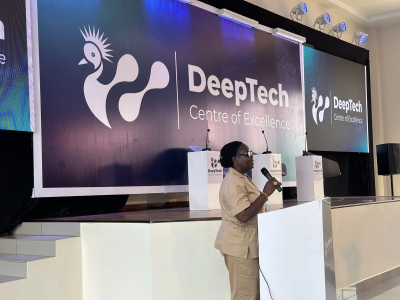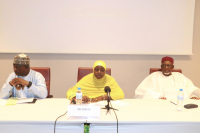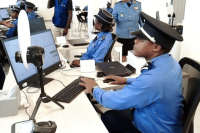
Tech (1150)
Cameroonian authorities have centralized all online gaming payment solutions under a single operator. While justified by security concerns related to gambling, this move is negatively impacting the burgeoning African video game industry. In this interview, Olivier Madiba, founder and CEO of Kiro’o Games—Central Africa's first professional video game studio, recognized internationally for promoting African values through entertainment—discussed the detrimental effects of this government decision on his studio's operations.
We Are Tech: In a recent X post, you mentioned that the Cameroonian government's decision to grant exclusive online gaming payment rights to InTouch has disrupted your services. Could you explain how this decision has specifically affected your business as an online gaming provider focused on entertainment, not gambling?
Olivier Madiba : I believe the Ministry of Territorial Administration's directive was primarily intended for gambling and online lottery services. However, because the legal term "online games" was used, those of us in the video game industry, which falls under culture and entertainment, have been unfairly impacted.
It’s important to understand that we provide a cultural entertainment service. We offer video game enthusiasts a competitive alternative, allowing them to enjoy gaming experiences rooted in African cultural references. This is our way of contributing to a market largely dominated by Western or Asian models, particularly Japanese ones. In contrast, gambling and lottery games are financial bets that can generate monetary winnings and, indeed, may be used for money laundering.
To comply with the directive, we are now obliged to switch payment providers in just three weeks, after years of establishing stable payments with our existing provider. While many payment aggregators exist, very few are reliable. We had to painstakingly vet them, case by case, at significant research and development (R&D) cost.
Just as we were overcoming that challenge, being forced to use a single operator now poses a major threat to our digital economy. This monopoly gives the selected operator the power to dictate terms in the most critical area: cash flow.
To illustrate the impact, for over ten days, we've received no payments from our customers—not just for video games, but for all our cross-media activities, including coloring books, comic books, Rebuntu, and more. These are consequences the government should have anticipated. The onboarding process with InTouch is, understandably, lengthy, despite their team's goodwill.
For a startup like ours, if we were 100% dependent on the Cameroonian market, this decision could push us straight into bankruptcy. And yet, as I often say, I created this job from scratch—both for myself and for my team."
WAT: Given that the president has himself encouraged digital innovation, why is it vital to avoid exclusivity and prioritize a competitive environment within this fintech segment?
Olivier Madiba : Given that online payments in Francophone Africa are made at least 80% via Mobile Money—If I’m not mistaken—avoiding a monopoly in this sector is crucial for two key reasons.
First, many fintech companies that aggregate Mobile Money services count online gambling operators—lotteries, sports betting, and other online gaming platforms—as major clients. Removing this customer base would severely cut their revenue, threatening their survival and the jobs they support.
Second, competition among these fintech companies is key to ensuring quality service. Clients like Kiro’o Games have switched aggregators at least two or three times or use multiple providers simultaneously to maintain service stability. A monopoly would eliminate this crucial safeguard, eroding customer trust and damaging the entire digital ecosystem that's been built over years.
WAT : Do you understand the government's security argument for this decision? It seems that authorities have not fully grasp the consequences this could have on the digital product value chain. Given your experience and based on conversations with industry experts, are there viable alternatives to a single-operator monopoly?
Olivier Madiba : We understand and support the government's core decision to regulate and track financial flows related to online gambling. However, we believe this should have been done through discussions with key stakeholders who understand the ecosystem, ensuring harmony within the value chain and anticipating potential consequences.
It's important to recognize the fundamental difference between video game operators like us and gambling or lottery operators. Our players pay for an entertainment service they actively control. In contrast, gambling players pay for the uncertain hope of financial gain, over which they have virtually no control. This crucial distinction is why gambling requires a license, while our industry does not.
For instance, the government could establish clear conditions that payment aggregators must meet to process payments for online gambling, or even online gaming in general. These conditions could include mandatory participation in rigorous government audits or the implementation of monitoring and control protocols, similar to those in place for banks. Additionally, the government should clearly define "online gambling" to avoid conflating simple entertainment games with gambling, preventing unnecessary regulatory burdens on unrelated digital activities.
We also believe this decision should have been made in consultation with the Ministry of Finance and the Ministry of Posts and Telecommunications. These ministries have been instrumental in integrating finance and technology in Cameroon and could have provided valuable expertise. Their input would likely have helped anticipate potential implications and define appropriate measures to mitigate any negative impacts."
WAT : How is this decision being received in the fintech sector? Does it create regulatory uncertainty that could deter investors? Given that Central Africa, especially Cameroon, already attracts less venture capital than markets like Kenya or Nigeria, do you think this could further hinder investment in the region's fintech sector?
Olivier Madiba : We have closely followed the public policy developments on this issue, and indeed, the successive decisions made by the authorities have introduced a level of uncertainty. Fintech is highly sensitive to changes in the economic environment.
We are competing on a global scale, and to succeed, we need to operate as a united and well-structured ecosystem. In many countries where online payment services are thriving, regulation plays a crucial role. Just as a physical economy requires efficient financial infrastructure, a digital economy needs highly sophisticated payment channels. For investors, this demand represents a real opportunity, as every transaction generates fees.
Take, for example, the competition in money transfer solutions—it has clearly benefited customers. Costs have decreased, and transaction volumes have risen. Similarly, companies like ours have been able to grow in ways that would have seemed impossible a decade ago. Back then, few would have bet on the viability of such a business model.
From this perspective, introducing uncertainty or excessive market concentration in our digital economy would be a costly mistake in an increasingly digital world. While this monopoly decision may indeed enhance security, I sincerely believe we can achieve that important goal while maintaining a sufficient level of competition to protect consumers from the risks associated with a near-monopoly.
WAT : Can you provide a clear explanation of how the payment system functions in these transactions, outlining the roles of the key players? How has government intervention altered these dynamics, and what are the resulting opportunities and risks?
Olivier Madiba : Here's how a typical digital payment with Mobile Money works:
The customer initiates a payment in a video game (or application) where they want to purchase digital content–not for gambling.
The system prompts them for their phone number and email to generate a receipt.
Once the customer provides this information, Kiro'o's server connects with the payment aggregator's server.
The aggregator's server then communicates with the Mobile Money provider's server, either Orange or MTN.
The player completes the payment through Orange or MTN.
The payment confirmation is sent back to the aggregator, who then forwards it to us.
Finally, the player receives payment confirmation and the digital content within the game.
It took us years to refine this process. Finding a reliable aggregator to handle steps three through six flawlessly is incredibly difficult.
Many aggregators are simply unreliable. By imposing a monopoly on a single aggregator, you eliminate competition, which removes the incentive to improve their technology. This could result in payment failures in as many as half of all transactions. Imagine customers making payments that you can't validate, even though their money has been debited.
That's the risk inherent in this monopoly decision—it could severely damage hard-earned consumer trust, disrupt the payment value chain, and impede the president's goal of digitizing our economy.
Interview by Idriss Linge
As information and communication technologies (ICT) continue to expand, young people are demonstrating remarkable ingenuity in addressing the challenges of their time. Through the Orange Summer Challenge, telecom operator Orange showcases these talents and supports them in developing their innovative solutions.
Orange Summer Challenge, Orange’s international competition dedicated to responsible entrepreneurship in Africa and the Middle East, unveiled the winners of its 2nd international final on Tuesday, February 26, in Casablanca, Morocco. Three innovative startups were recognized for their potential impact: Plastikoo, MEPS, and Leevlong, selected for their solutions addressing environmental, health, and social challenges.
Over the course of three months, 282 young innovators from 14 countries received intensive support, including training, mentorship, and coaching provided by experts from Orange and its partners, including AWS, EY, and Nokia. In total, 57 startups emerged under the Tech4Impact theme, offering solutions in environment, health, education, and agriculture.
The first prize went to Plastikoo, a Malagasy startup that transforms plastic waste into sustainable construction materials, helping reduce pollution and promote sustainable community development. MEPS, a Tunisian startup that won second place, developed a solution to convert organic waste into biogas and fertilizer, contributing to the energy transition. Leevlong, a Cameroonian startup ranked third, offers a remote medical monitoring device for real-time patient tracking, improving healthcare management.
The winners will receive financial, technical, and commercial support from Orange Digital Centers and their partners. Nokia will provide a €40,000 grant to fund the pre-incubation and incubation of the projects, while Orange will contribute €20,000 to support these young entrepreneurs.
For Orange, this edition once again highlights the dynamism and creativity of young innovators. “For 15 years, the Orange Summer Challenge has supported thousands of young talents in their entrepreneurial journey. This new edition once again demonstrates the ability of African and Middle Eastern youth to innovate and address the societal challenges of our continent. Congratulations to the winners and all participants for their dedication and creativity,” said Brelotte Ba, Deputy CEO of Orange Africa and Middle East.
By Samira Njoya,
Editing by Sèna D. B. de Sodji
Manufacturing plays a crucial role in Africa's economy. Establishing these facilities is expected to further diversify the industrial base, foster resilience against economic fluctuations, and enhance self-sufficiency.
Uganda has launched a state-of-the-art Local Electronics Manufacturing Facility and the Deep Technology Centre of Excellence under the Ministry of Science, Technology, and Innovation. The initiative, unveiled on February 20, aligns with the government's commitment to Uganda’s National Development Plan III and strengthens the country’s position in high-tech manufacturing.
“This milestone is not only a leap forward in our Nation’s journey toward technological advancement and the qualitative leap but also a tangible demonstration of the Government’s commitment to operationalizing Uganda National Development Plan III, ” Minister of Energy and Mineral Development, Ruth Nankabirwa, stated in a LinkedIn post.
The Deep Technology Centre of Excellence is a modern facility dedicated to advancing innovation in emerging technologies, including Artificial Intelligence, Machine Learning, the Internet of Things, Robotics, Biotechnology, Advanced Materials, Cloud and Edge Computing, and Quantum Computing.
The launch highlights the power of public-private collaboration, with government ministries, private sector players, academia, and local communities encouraged to seize this opportunity for innovation and growth. The Energy sector is expected to benefit significantly from the local production of power meters at the center. This will enhance the national grid while enabling businesses and households to monitor and optimize energy consumption.
Beyond energy, the new facilities are set to create jobs, develop skills, and drive innovation, reducing Uganda’s reliance on imports and enhancing its global competitiveness. Officials emphasized that investing in local manufacturing will build a resilient economy and position Uganda as a leader in technology and industrialization.
Uganda's reliance on imported electrical and electronic equipment has been substantial, with imports projected to reach $429 million by 2028, up from an estimated $406 million in 2023. By investing in local manufacturing capabilities, the country can decrease this dependency, retaining capital within the economy and improving the trade balance.
Hikmatu Bilali
Digital banking adoption is growing across the continent, driven by increasing smartphone penetration. However, rising digital fraud continues to pose significant security challenges. Strengthening authentication processes will help protect users, build trust in digital banking, and support the financial sector’s growth.
Digital identity verification and authentication provider Smile ID has announced a partnership with Plumery, a provider of digital banking experience systems, to enhance digital transformation and strengthen customer authentication for financial institutions across Africa.
Dustin Strydom, VP of Commercial at Smile ID, described the partnership as a pivotal step in strengthening financial security across Africa. He emphasized that integrating Plumery’s digital banking platform with Smile ID’s authentication technology provides scalable solutions that empower financial institutions in the digital era.
This collaboration allows banks, fintechs, and other financial institutions to integrate Plumery’s API-first digital banking platform with Smile ID’s advanced identity verification and fraud prevention tools. The integration aims to reduce implementation costs, improve authentication processes, and deliver secure, seamless digital banking experiences.
According to Smile ID's 2025 Fraud in Africa Report: Trends, Tactics, and Key Solutions to Tackle Fraud Effectively, digital banks experienced the highest fraud attempts in 2024, accounting for 35% of all biometric and document verifications, followed closely by microfinance institutions at 30%. These sectors remain prime targets for sophisticated schemes, including identity farming, account takeovers, and money laundering.
By embedding secure authentication processes directly into the digital banking journey, this collaboration enhances fraud detection, prevents account takeovers, and strengthens financial institutions’ ability to combat identity-related crimes
Hikmatu Bilali
In Africa, ghost employees are still exploiting outdated management systems to fraudulently collect salaries. To address this, many countries are implementing biometric technology, which provides a robust solution for securing workforce management and improving administrative transparency.
The Cameroonian government will introduce a biometric system to track the physical presence of public sector employees at their workplaces, Minister of Public Service and Administrative Reform Joseph LE announced Tuesday.Speaking at a press briefing aired on national public television on February 25, LE said the initiative aims to reduce absenteeism and eliminate ghost employees from the state payroll.
"By enabling a unique and tamper-proof identification of each employee, this system will ensure stricter workforce management. It will also enhance transparency within the administration and contribute to a vigorous fight against absenteeism, which has been strongly criticized in recent months by the highest authorities of our country," LE said.
The move is part of Cameroon’s broader digital transformation efforts, aligning with the country’s National Development Strategy 2030 (SND-30). It is also a key component of the “Aigle” program, launched in January, which seeks to modernize public administration through new technologies. The goal is to optimize public service management and improve government policy efficiency.
The biometric system will utilize technologies such as fingerprint scanners and facial recognition devices to verify employees' physical presence. Upon arrival, employees will authenticate themselves in real time, ensuring a secure and accurate attendance record. This tamper-proof identification method will guarantee employee authenticity and strengthen workforce monitoring.
While an exact implementation date was not provided, LE said the project will begin with a pilot phase in three key administrations: the Ministry of Public Service, the Ministry of Finance, and the Supreme State Audit Office. The pilot will be followed by a gradual rollout, accompanied by targeted training for managers to facilitate adoption and maximize the system’s effectiveness.
The introduction of biometrics in the public sector is expected to reduce administrative fraud, eliminate ghost employees, and optimize state resources. However, the system's implementation will face technical and ethical challenges, particularly concerning data protection and social acceptability. The ultimate goal is to clean up the public administration and eradicate ghost employees, who cost African governments tens of billions of CFA francs annually.
By Samira Njoya,
Editing by Sèna D. B. de Sodji
Streamlining case reporting and evidence submission reduces delays in investigation and prosecution, ensuring swifter justice for survivors. Leveraging AI and digital tools can help break barriers to justice, empowering survivors, and holding perpetrators accountable. These innovations are essential in reducing domestic violence and ensuring a safer society for all.
The Lagos State Domestic and Sexual Violence Agency (DSVA) announced yesterday February 24 the introduction of two digital initiatives to enhance support for domestic violence survivors: an AI chatbot, Ask INU, and a self-reporting evidence portal. These initiatives aim to strengthen evidence collection, enhance access to services, and reduce domestic violence cases in Lagos State.
DSVA Executive Secretary Vivour-Adeniyi emphasized that these initiatives reaffirm Lagos State’s commitment to breaking the culture of silence, supporting survivors, and ensuring perpetrator accountability.
Ask INU (I Need You) is a WhatsApp-based chatbot that provides immediate information and referrals to survivors. Users can access support by sending a message to 0812 893 7058 on WhatsApp.
The Domestic and Sexual Violence Case Management System (DSVCMS) now includes a Self-Reporting Tool, allowing survivors and mandated reporters to securely submit case details and upload evidence via lagosdsvcms.org. The platform helps preserve crucial materials such as pictures, audio recordings, and medical reports—key for ensuring swift justice.
According to UN Women, approximately 1 in 3 women aged 15-49 in Nigeria have experienced physical or sexual violence. The introduction of digital support tools like Ask INU and the Self-Reporting Evidence Portal directly addresses a critical need for accessible, confidential, and efficient support services.
By providing immediate assistance via WhatsApp and secure evidence storage, DSVA is reducing barriers to reporting and ensuring survivors have a pathway to justice and support, ultimately strengthening efforts to combat domestic and sexual violence in Lagos State.
Hikmatu Bilali
To simplify the lives of its citizens, the Nigerien government is implementing innovative solutions. These initiatives prioritize the modernization of public services and the promotion of digital technology access, ultimately supporting the country's economic and social progress.
Niger's autonomous pension fund, CARENI, inaugurated its new digital platform, "CARENI COLLECTE," on Monday, February 24, in Niamey, aiming to streamline pension registration and simplify access to benefits for over 35,000 Nigerien retirees. The retirees collectively receive over 3 billion CFA francs (approximately $5 million) per month.
“The CARENI COLLECTE application we are launching today is more than just digitalization—it represents a profound transformation in our management system,” said Ali Ousseini Hadiza (photo, center), Director General of CARENI. She emphasized that the platform is built around five key pillars, including a biometric card featuring a fingerprint and essential personal information, replacing the traditional booklet.
The biometric card will identify civil servants and facilitate access to medical coverage services, reducing the need for retirees to visit CARENI offices. This innovation is expected to eliminate long queues and repeated visits.
This project is part of a broader digital transformation initiative in Niger, as public institutions accelerate their shift toward e-governance. Like many countries, Niger aspires to enhance its global standing in digital administration. According to the latest United Nations e-Government Development Index, Niger ranks 187th out of 193 countries, with a score of 0.21157 out of 1. These figures highlight the urgent need for modernization in public administration.
The implementation of CARENI COLLECTE is expected to greatly improve pension access and healthcare services, ultimately enhancing retirees' quality of life. However, challenges remain, particularly in raising awareness and training users to navigate digital tools, as well as addressing connectivity issues in rural areas. Continuous support for retirees and ongoing improvements to the platform will be crucial to ensuring the initiative’s full success.
By Samira Njoya,
Editing by Sèna D. B. de Sodji
Digitalization is crucial for SMEs as it enhances efficiency, reduces operational costs, expands market reach, and fosters innovation. Empowering small businesses with digital tools and financing in Africa can create more jobs, boost GDP, and strengthen the continent’s position in the global digital economy.
The National Information Technology Development Agency (NITDA) announced on February 21 that it has partnered with Flutterwave, Alami, a fintech company that offers sharia-compliant financing solutions for SMEs, and the Small and Medium Enterprises Development Agency of Nigeria (SMEDAN). The partnership aims to empower MSMEs with digital tools and improved access to financing. The three parties signed a Memorandum of Understanding (MoU) to formalize their collaboration.
The partnership was made during a high-level meeting led by NITDA’s Director General, Kashifu Inuwa, alongside representatives from Flutterwave and Alami, in discussions with SMEDAN’s CEO, Charles Odii. The key focus of the engagement was on leveraging digitalisation to boost the productivity and competitiveness of MSMEs, which are vital to Nigeria’s economic growth.
During the discussions, Inuwa highlighted the impact of digitalisation on MSMEs, stating that digitally empowered businesses can increase productivity by up to 120%, significantly strengthening Nigeria’s economy. He also reaffirmed NITDA’s commitment to championing digital capacity-building initiatives that will enable MSMEs to scale and thrive in the digital economy.
This partnership builds upon an earlier collaboration aimed at transforming the sector. In February 2024, NITDA and SMEDAN launched an initiative to improve digital literacy for over 40 million Small and Medium Enterprises (SMEs) across the country.
According to a newsletter publication by the International Labour Organization (ILO) Country Office in Nigeria, SMEs account for 48% of the national GDP, 96% of all businesses, and 84% of employment in Nigeria. This highlights the crucial role of MSMEs in Nigeria’s economy, reinforcing the importance of the partnership. Empowering MSMEs with digital tools and financial access will have a direct and far-reaching impact on Nigeria’s economic growth.
Hikmatu Bilali
The Malian government is working to digitize all public services within the next few years. Early results of this initiative are evident through measures designed to increase accessibility and enhance the efficiency of government services.
On Tuesday, February 18, Mali unveiled a new digital platform designed to facilitate access to administrative, identity, and travel documents for its diaspora. Deployed across the country’s diplomatic and consular missions worldwide, the solution aims to enhance user confidence through advanced security protocols and robust data protection measures.
“The launch of this platform and its operational rollout in 15 days reflect our commitment to a more efficient and responsive administration. This initiative represents a significant step forward in modernizing and safeguarding administrative data while simplifying access to essential documents for our compatriots abroad,” said Abdoulaye Diop, Minister of Foreign Affairs and International Cooperation.
Fully designed and developed by Malian experts, the platform strengthens the country’s digital sovereignty while improving services for both citizens and foreigners. In addition to streamlining procedures for the Malian diaspora, the system will also benefit travelers by digitizing the visa application process. In the future, the platform will be compatible with the Visa Liptako, a confederal visa system introduced by the Alliance of Sahel States (AES) to facilitate regional mobility.
This initiative aligns with Mali’s broader digital transformation strategy, which seeks to enhance the efficiency of public services. While the country has climbed 13 spots in the United Nations e-Government Development Index (EGDI), now ranking 141st out of 193 countries, challenges remain in making digital services more accessible and effective.
A successful rollout of the platform is expected to cut bureaucracy, reduce processing times, optimize public resource management, and lower administrative costs. Close coordination between relevant ministries will be crucial to ensuring the project’s efficiency and long-term sustainability.
By Samira Njoya,
Editing by Sèna D. B. de Sodji
Cameroon has started issuing new national identity cards, a key step in its digital identity management initiative. These cards are designed to modernize and secure identity verification.
Cameroonians can pre-enroll, online since February 17, to obtain the country’s new national identity card (CNI). Developed by German company Augentic in partnership with the General Delegation for National Security (DGSN), this new biometric and digital ID marks a significant step forward in identity management, with major security, economic, and social implications.
The new ID card meets international ISO/IEC 9303 standards and incorporates advanced security features. It includes an electronic chip or a Machine Readable Zone (MRZ) containing all recorded data, as well as a unique QR code. These technological upgrades strengthen fraud prevention, making identity theft and forgery significantly more difficult while facilitating automated verification both nationally and internationally.
A Gateway to E-Services
Beyond security, the digital nature of the new ID card holds vast economic and social potential. By linking the card to a unique digital identifier, citizens could gain access to secure government platforms, such as tax services, social security, and online payments.
Reliable biometric identification would also simplify banking procedures, enabling remote account openings and expanding financial inclusion. Financial institutions could use digital identities to assess creditworthiness, making it easier for individuals to access microloans and tailored insurance services. A trustworthy digital identity is fundamental to fostering confidence in economic transactions and could also benefit the e-commerce sector.
Additionally, the new ID could serve as the foundation for secure electronic voting systems, reducing electoral fraud risks and ensuring greater transparency in democratic processes.
Towards E-Governance and Smarter Public Policies
Biometric and digital identity plays a crucial role in social planning by providing the government with authenticated data on citizens, including employment status, disability, education level, residency, and family ties. With this data, authorities can better target social programs such as family allowances, scholarships, and housing aid. The digital ID system would also generate reliable statistical insights for economic planning, including tax forecasting and job creation strategies.
However, for the new ID card to serve as a true gateway to digital services and a tool for poverty reduction, Cameroon must establish a robust, interconnected identification system. This requires a strong legal framework to regulate digital identity and stringent data protection measures, as personal information is becoming a critical resource in the fourth industrial revolution.
By Samira Njoya,
Editing by Sèna D. B. de Sodji
More...
The Algerian government has made digital transformation a key pillar of the country’s socioeconomic development. Beyond investing in infrastructure, authorities are also focused on equipping the population with the digital skills needed to achieve these ambitions.
Algeria's Minister of Post and Telecommunications, Sid Ali Zerrouki, inaugurated a Skills Center in Sétif on February 20. The center will provide free training for young people in advanced digital technologies.
Similar infrastructure will be established nationwide to equip Algerian youth with future-ready skills, enabling their integration into the national and global digital economy. They will offer training in Artificial Intelligence (AI), Cloud Computing, the Internet of Things (IoT), Cybersecurity, and other Information and Communication Technologies (ICT) fields.
The initiative aligns with Algeria Digital 2030, the government’s national strategy, which aims to accelerate Algeria’s digital transformation by expanding ICT adoption across all economic sectors and developing a skilled workforce by prioritizing capacity building as one of its five key pillars.
The importance of digital skills is growing across Africa. According to the World Bank, an estimated 230 million jobs in Sub-Saharan Africa will require digital expertise by 2030. While Algeria is not part of this region, the trend underscores the necessity of digital training for the continent’s economic transformation. A joint study by the International Finance Corporation (IFC) and Google predicts that Africa’s digital economy will be worth at least $712 billion by 2050, representing 8.5% of the continent’s GDP.
By Isaac K. Kassouwi,
Editing by Sèna D. B. de Sodji
As part of its digital transformation strategy, Senegal is targeting a significant increase in the contribution of its digital sector, aiming for at least 15% of GDP within the next ten years. To achieve this ambitious goal, the government is committed to unifying its digital initiatives and streamlining projects to enhance efficiency and impact.
Senegal will establish a Digital Governance Committee, GouvNum, to coordinate and streamline its digital initiatives, officials said. The project, approved during a Council of Ministers meeting on February 19, aims to create a cohesive framework for state-led digital transformation.
According to the Ministry of Digital Transformation, the past two decades have seen massive investments in modernizing public digital infrastructure and interconnecting government entities. These efforts laid the foundation for a national information system and a government enterprise architecture. However, a fragmented approach to digital projects has led to duplication, inconsistencies, rising inefficiencies, cybersecurity vulnerabilities, and misalignment between sectoral strategies and the national digital agenda. These challenges hindered the goals set by the previous digital strategy (SN20-25).
The creation of GouvNum aligns with Senegal’s new digital strategy, the New Deal Technologique, set to launch on February 24. This committee will provide a unified governance framework for digital initiatives, ensuring project coordination, strategic alignment across sectors, improved system security, and more effective monitoring and evaluation.
Additionally, GouvNum will enhance the prioritization of digital programs, laying the groundwork for a more efficient and integrated digital transformation. A key objective of this effort is to boost the digital sector’s contribution to at least 15% of GDP within the next decade. This ambition will be driven by a structured approach under the New Deal Technologique, which includes 12 targeted programs designed to accelerate Senegal’s digital economy.
By Samira Njoya,
Editing by Sèna D. B. de Sodji
The interoperability of digital payments is emerging as a key driver for modernizing financial systems and enhancing banking inclusion. By connecting banks and fintechs, these platforms foster innovation in the financial sector.
Comoros will implement an interoperable digital payment switch, with Moroccan electronic payment solutions company PayLogic executing the project. The company announced the initiative in a statement on Sunday, February 16, marking a step in the country's financial infrastructure modernization.
"This project is a testament to our dedication to delivering innovative solutions that transform financial ecosystems. By implementing an interoperable payment switch, we are helping to create a more inclusive and efficient financial infrastructure in the Union of Comoros. We are excited to partner with local stakeholders to bring this vision to life," said Mohamed Mekouar, Executive Chairman of PayLogic.
The platform, part of the Financial Sector Development Support Project (PADSF), aims to connect financial institutions, banks, and payment service providers, creating a seamless and inclusive digital payment ecosystem. This interoperability will allow users to make instant transfers between mobile operators, between banks, and between mobile operators and bank accounts.
The initiative aligns with the Central Bank of Comoros’ policy to promote financial inclusion. The institution has encouraged local banks to offer free bank account openings for individuals and fee-free money transfers for the diaspora. Since early August, this measure has led to the opening of hundreds of new accounts, with a goal of reaching a 50% banking penetration rate by the end of 2025.
PayLogic's interoperable switch could strengthen these efforts by improving access to digital financial services, especially for rural populations and the diaspora. Reducing reliance on cash and enhancing transaction efficiency will drive broader adoption of banking and online payment services across the country.
By Samira Njoya,
Editing by Sèna D. B. de Sodji
By working closely with the Nigerian government and its partners, Microsoft is playing a pivotal role in building a digitally skilled workforce and positioning Nigeria as a leader in AI and emerging technologies.
Microsoft has unveiled a $1 million investment in its AI Skilling Initiative, aimed at training one million Nigerians in artificial intelligence (AI) over the next two years. The announcement was made on February 19 during the Microsoft AI Tour in Lagos, a gathering of business leaders, IT professionals, and developers focused on exploring the latest advancements in AI.
Managing Director of Microsoft Nigeria and Ghana, Ola Williams emphasized the company’s dedication to AI’s transformative potential. She also highlighted that Microsoft's commitment to advancing AI skills in Nigeria underscores its dedication to empowering individuals and organizations to achieve greater success.
Microsoft reinforces its commitment to Nigeria’s digital transformation with this latest investment. The initiative is poised to drive economic growth, industrialization, social inclusion, and technological innovation, ultimately shaping a future where AI-powered opportunities are accessible to all Nigerians.
This initiative is set to accelerate AI adoption in Nigeria, reinforcing the country's status as a leading force in Africa’s digital economy. It aligns with the strategic goals outlined in Nigeria’s National Artificial Intelligence Strategy (NAIS), which envisions the nation as a global leader in leveraging AI for responsible, ethical, and inclusive innovation. The NAIS highlights Nigeria’s rapidly expanding AI market, which is projected to reach $434.4 million by 2026, with a compound annual growth rate (CAGR) of 44.2%.
Hikmatu Bilali















